Reflective Journal Essay: Health and Social Care Issues Analysis
VerifiedAdded on 2020/06/04
|7
|1668
|191
Essay
AI Summary
This essay presents a reflective analysis of health and social care issues, focusing on relevant legislation, policies, and ethical practices. It begins with an introduction to reflective journals and their importance in understanding health and social care. The main body delves into the Disability Act 2005, Employment Equality Act 1998, and Equal Status Acts 2000 & 2004, examining their impact on ethical practices within the healthcare sector. The essay also addresses the challenges faced by the NHS, particularly concerning staffing shortages and the impact of EU policies on healthcare professionals. Furthermore, it explores the knowledge and understanding of diverse identities within the healthcare system, including the effects of immigration and the need for appropriate regulations. The essay concludes by referencing various books and journals that support the discussed topics, offering a comprehensive overview of the complexities within health and social care.
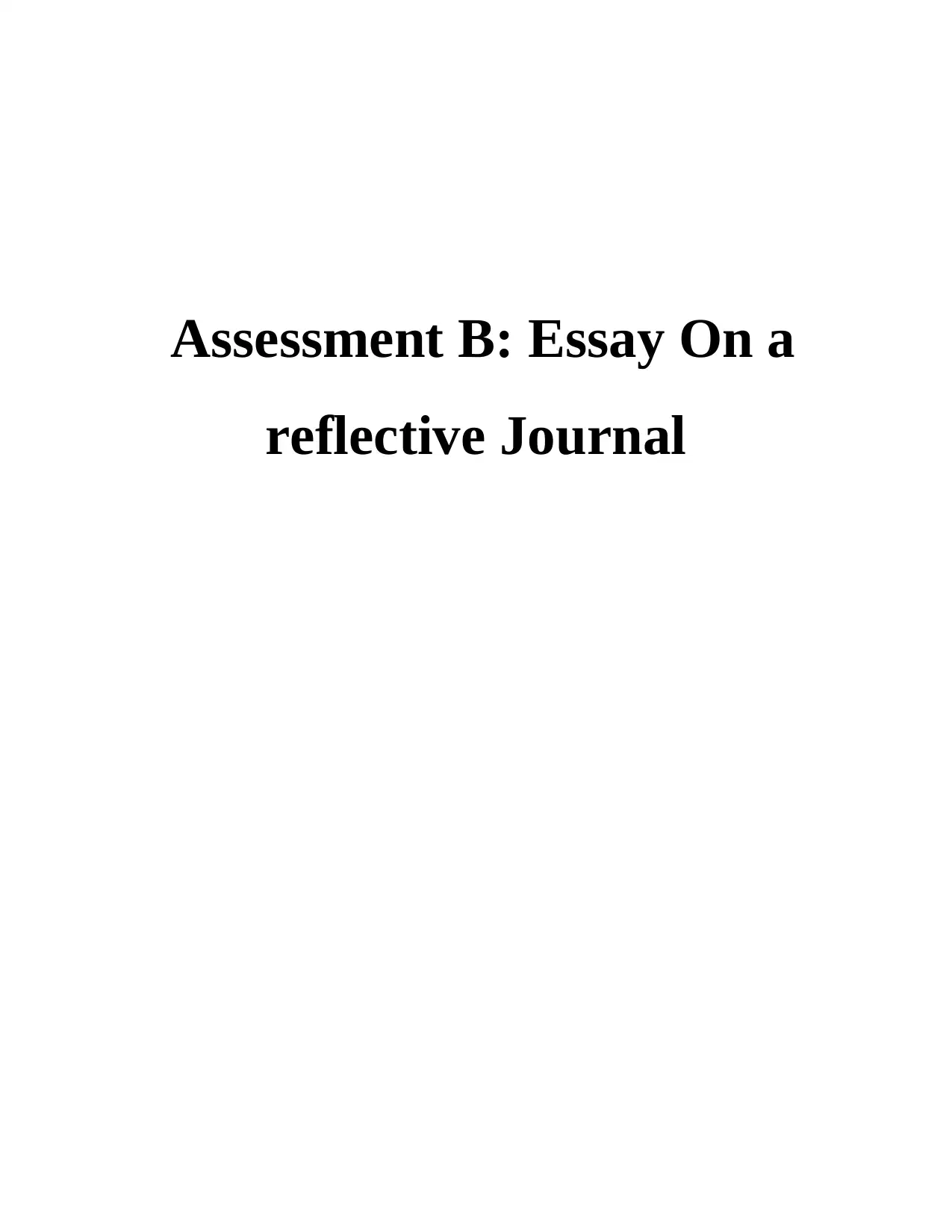
Assessment B: Essay On a
reflective Journal
reflective Journal
Paraphrase This Document
Need a fresh take? Get an instant paraphrase of this document with our AI Paraphraser

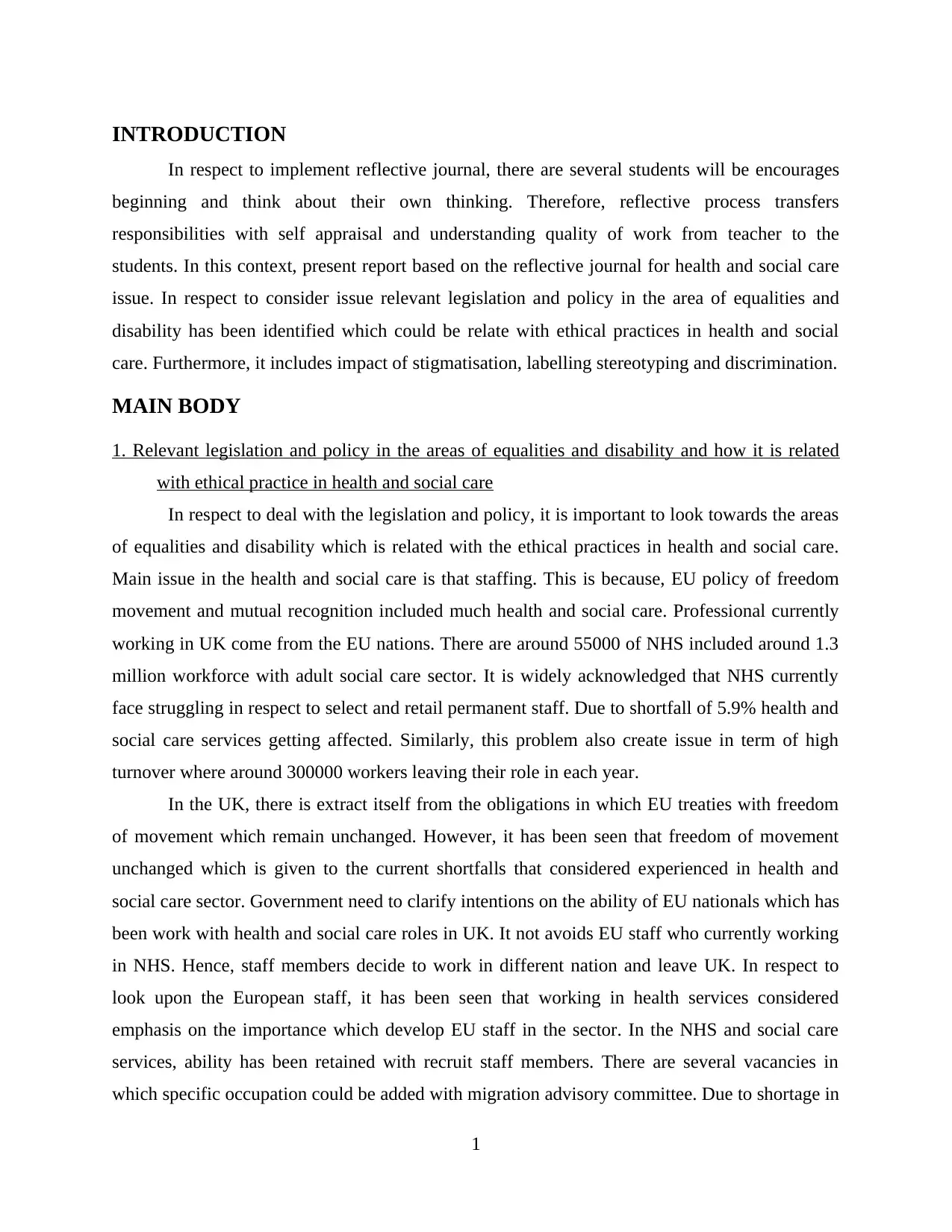
INTRODUCTION
In respect to implement reflective journal, there are several students will be encourages
beginning and think about their own thinking. Therefore, reflective process transfers
responsibilities with self appraisal and understanding quality of work from teacher to the
students. In this context, present report based on the reflective journal for health and social care
issue. In respect to consider issue relevant legislation and policy in the area of equalities and
disability has been identified which could be relate with ethical practices in health and social
care. Furthermore, it includes impact of stigmatisation, labelling stereotyping and discrimination.
MAIN BODY
1. Relevant legislation and policy in the areas of equalities and disability and how it is related
with ethical practice in health and social care
In respect to deal with the legislation and policy, it is important to look towards the areas
of equalities and disability which is related with the ethical practices in health and social care.
Main issue in the health and social care is that staffing. This is because, EU policy of freedom
movement and mutual recognition included much health and social care. Professional currently
working in UK come from the EU nations. There are around 55000 of NHS included around 1.3
million workforce with adult social care sector. It is widely acknowledged that NHS currently
face struggling in respect to select and retail permanent staff. Due to shortfall of 5.9% health and
social care services getting affected. Similarly, this problem also create issue in term of high
turnover where around 300000 workers leaving their role in each year.
In the UK, there is extract itself from the obligations in which EU treaties with freedom
of movement which remain unchanged. However, it has been seen that freedom of movement
unchanged which is given to the current shortfalls that considered experienced in health and
social care sector. Government need to clarify intentions on the ability of EU nationals which has
been work with health and social care roles in UK. It not avoids EU staff who currently working
in NHS. Hence, staff members decide to work in different nation and leave UK. In respect to
look upon the European staff, it has been seen that working in health services considered
emphasis on the importance which develop EU staff in the sector. In the NHS and social care
services, ability has been retained with recruit staff members. There are several vacancies in
which specific occupation could be added with migration advisory committee. Due to shortage in
1
In respect to implement reflective journal, there are several students will be encourages
beginning and think about their own thinking. Therefore, reflective process transfers
responsibilities with self appraisal and understanding quality of work from teacher to the
students. In this context, present report based on the reflective journal for health and social care
issue. In respect to consider issue relevant legislation and policy in the area of equalities and
disability has been identified which could be relate with ethical practices in health and social
care. Furthermore, it includes impact of stigmatisation, labelling stereotyping and discrimination.
MAIN BODY
1. Relevant legislation and policy in the areas of equalities and disability and how it is related
with ethical practice in health and social care
In respect to deal with the legislation and policy, it is important to look towards the areas
of equalities and disability which is related with the ethical practices in health and social care.
Main issue in the health and social care is that staffing. This is because, EU policy of freedom
movement and mutual recognition included much health and social care. Professional currently
working in UK come from the EU nations. There are around 55000 of NHS included around 1.3
million workforce with adult social care sector. It is widely acknowledged that NHS currently
face struggling in respect to select and retail permanent staff. Due to shortfall of 5.9% health and
social care services getting affected. Similarly, this problem also create issue in term of high
turnover where around 300000 workers leaving their role in each year.
In the UK, there is extract itself from the obligations in which EU treaties with freedom
of movement which remain unchanged. However, it has been seen that freedom of movement
unchanged which is given to the current shortfalls that considered experienced in health and
social care sector. Government need to clarify intentions on the ability of EU nationals which has
been work with health and social care roles in UK. It not avoids EU staff who currently working
in NHS. Hence, staff members decide to work in different nation and leave UK. In respect to
look upon the European staff, it has been seen that working in health services considered
emphasis on the importance which develop EU staff in the sector. In the NHS and social care
services, ability has been retained with recruit staff members. There are several vacancies in
which specific occupation could be added with migration advisory committee. Due to shortage in
1
⊘ This is a preview!⊘
Do you want full access?
Subscribe today to unlock all pages.

Trusted by 1+ million students worldwide
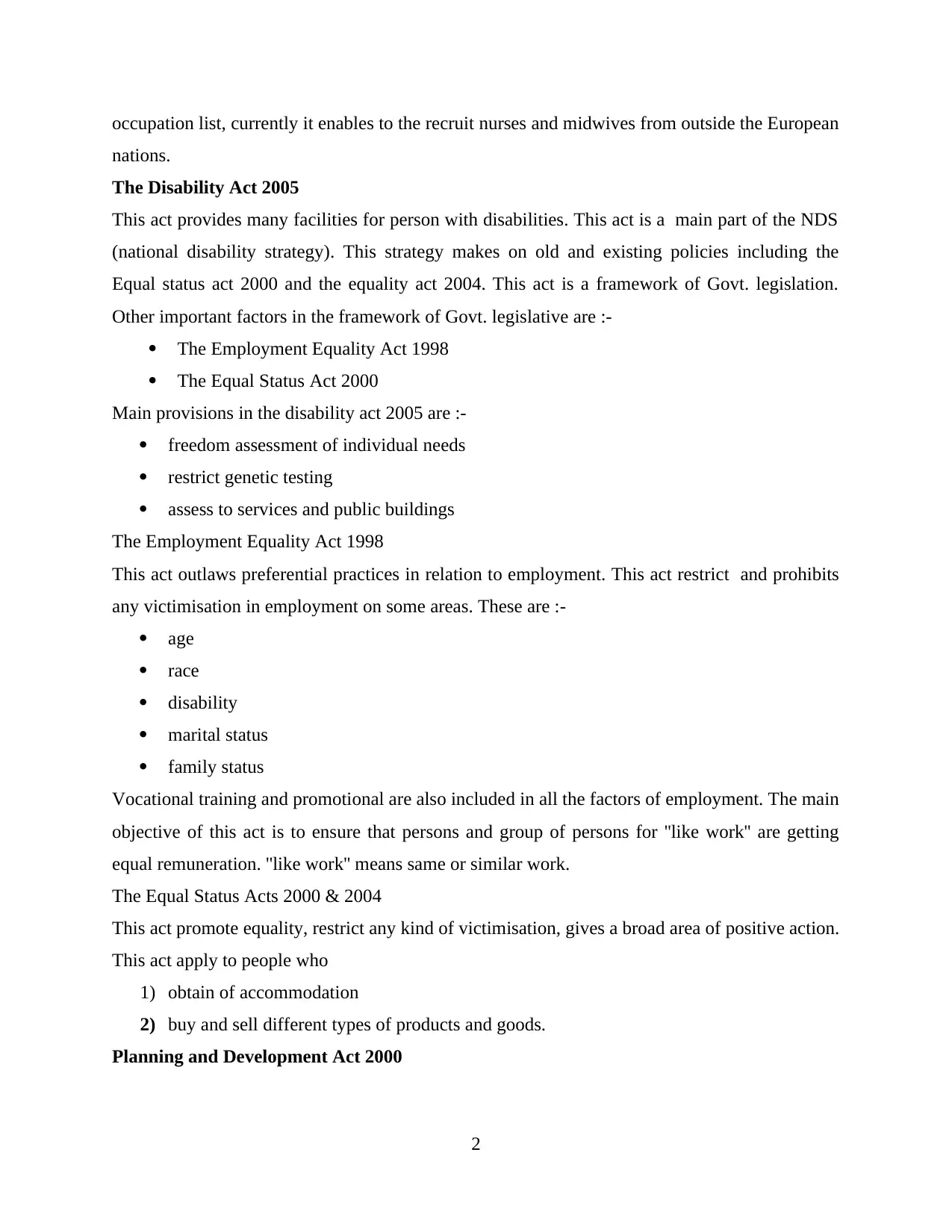
occupation list, currently it enables to the recruit nurses and midwives from outside the European
nations.
The Disability Act 2005
This act provides many facilities for person with disabilities. This act is a main part of the NDS
(national disability strategy). This strategy makes on old and existing policies including the
Equal status act 2000 and the equality act 2004. This act is a framework of Govt. legislation.
Other important factors in the framework of Govt. legislative are :-
The Employment Equality Act 1998
The Equal Status Act 2000
Main provisions in the disability act 2005 are :-
freedom assessment of individual needs
restrict genetic testing
assess to services and public buildings
The Employment Equality Act 1998
This act outlaws preferential practices in relation to employment. This act restrict and prohibits
any victimisation in employment on some areas. These are :-
age
race
disability
marital status
family status
Vocational training and promotional are also included in all the factors of employment. The main
objective of this act is to ensure that persons and group of persons for ''like work'' are getting
equal remuneration. ''like work'' means same or similar work.
The Equal Status Acts 2000 & 2004
This act promote equality, restrict any kind of victimisation, gives a broad area of positive action.
This act apply to people who
1) obtain of accommodation
2) buy and sell different types of products and goods.
Planning and Development Act 2000
2
nations.
The Disability Act 2005
This act provides many facilities for person with disabilities. This act is a main part of the NDS
(national disability strategy). This strategy makes on old and existing policies including the
Equal status act 2000 and the equality act 2004. This act is a framework of Govt. legislation.
Other important factors in the framework of Govt. legislative are :-
The Employment Equality Act 1998
The Equal Status Act 2000
Main provisions in the disability act 2005 are :-
freedom assessment of individual needs
restrict genetic testing
assess to services and public buildings
The Employment Equality Act 1998
This act outlaws preferential practices in relation to employment. This act restrict and prohibits
any victimisation in employment on some areas. These are :-
age
race
disability
marital status
family status
Vocational training and promotional are also included in all the factors of employment. The main
objective of this act is to ensure that persons and group of persons for ''like work'' are getting
equal remuneration. ''like work'' means same or similar work.
The Equal Status Acts 2000 & 2004
This act promote equality, restrict any kind of victimisation, gives a broad area of positive action.
This act apply to people who
1) obtain of accommodation
2) buy and sell different types of products and goods.
Planning and Development Act 2000
2
Paraphrase This Document
Need a fresh take? Get an instant paraphrase of this document with our AI Paraphraser
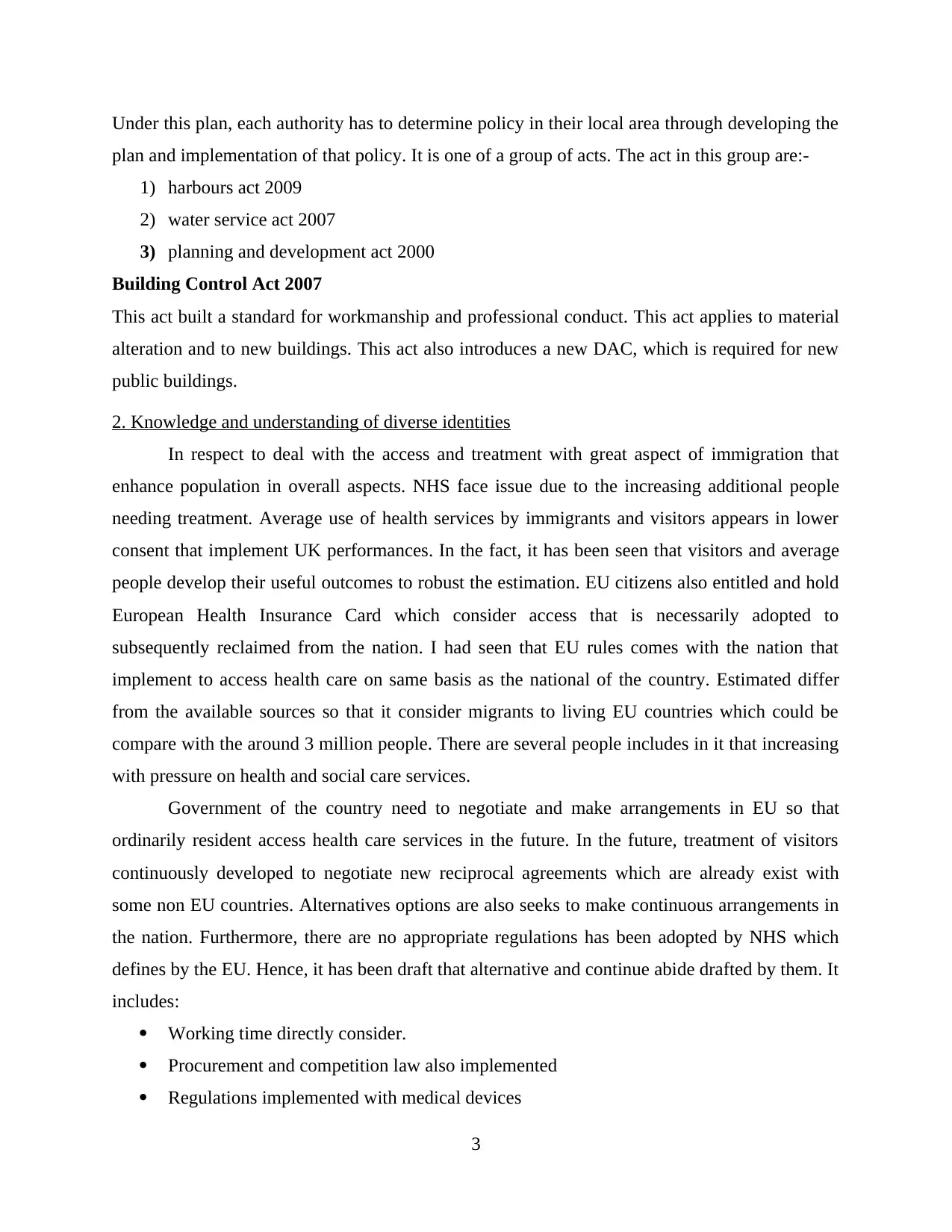
Under this plan, each authority has to determine policy in their local area through developing the
plan and implementation of that policy. It is one of a group of acts. The act in this group are:-
1) harbours act 2009
2) water service act 2007
3) planning and development act 2000
Building Control Act 2007
This act built a standard for workmanship and professional conduct. This act applies to material
alteration and to new buildings. This act also introduces a new DAC, which is required for new
public buildings.
2. Knowledge and understanding of diverse identities
In respect to deal with the access and treatment with great aspect of immigration that
enhance population in overall aspects. NHS face issue due to the increasing additional people
needing treatment. Average use of health services by immigrants and visitors appears in lower
consent that implement UK performances. In the fact, it has been seen that visitors and average
people develop their useful outcomes to robust the estimation. EU citizens also entitled and hold
European Health Insurance Card which consider access that is necessarily adopted to
subsequently reclaimed from the nation. I had seen that EU rules comes with the nation that
implement to access health care on same basis as the national of the country. Estimated differ
from the available sources so that it consider migrants to living EU countries which could be
compare with the around 3 million people. There are several people includes in it that increasing
with pressure on health and social care services.
Government of the country need to negotiate and make arrangements in EU so that
ordinarily resident access health care services in the future. In the future, treatment of visitors
continuously developed to negotiate new reciprocal agreements which are already exist with
some non EU countries. Alternatives options are also seeks to make continuous arrangements in
the nation. Furthermore, there are no appropriate regulations has been adopted by NHS which
defines by the EU. Hence, it has been draft that alternative and continue abide drafted by them. It
includes:
Working time directly consider.
Procurement and competition law also implemented
Regulations implemented with medical devices
3
plan and implementation of that policy. It is one of a group of acts. The act in this group are:-
1) harbours act 2009
2) water service act 2007
3) planning and development act 2000
Building Control Act 2007
This act built a standard for workmanship and professional conduct. This act applies to material
alteration and to new buildings. This act also introduces a new DAC, which is required for new
public buildings.
2. Knowledge and understanding of diverse identities
In respect to deal with the access and treatment with great aspect of immigration that
enhance population in overall aspects. NHS face issue due to the increasing additional people
needing treatment. Average use of health services by immigrants and visitors appears in lower
consent that implement UK performances. In the fact, it has been seen that visitors and average
people develop their useful outcomes to robust the estimation. EU citizens also entitled and hold
European Health Insurance Card which consider access that is necessarily adopted to
subsequently reclaimed from the nation. I had seen that EU rules comes with the nation that
implement to access health care on same basis as the national of the country. Estimated differ
from the available sources so that it consider migrants to living EU countries which could be
compare with the around 3 million people. There are several people includes in it that increasing
with pressure on health and social care services.
Government of the country need to negotiate and make arrangements in EU so that
ordinarily resident access health care services in the future. In the future, treatment of visitors
continuously developed to negotiate new reciprocal agreements which are already exist with
some non EU countries. Alternatives options are also seeks to make continuous arrangements in
the nation. Furthermore, there are no appropriate regulations has been adopted by NHS which
defines by the EU. Hence, it has been draft that alternative and continue abide drafted by them. It
includes:
Working time directly consider.
Procurement and competition law also implemented
Regulations implemented with medical devices
3
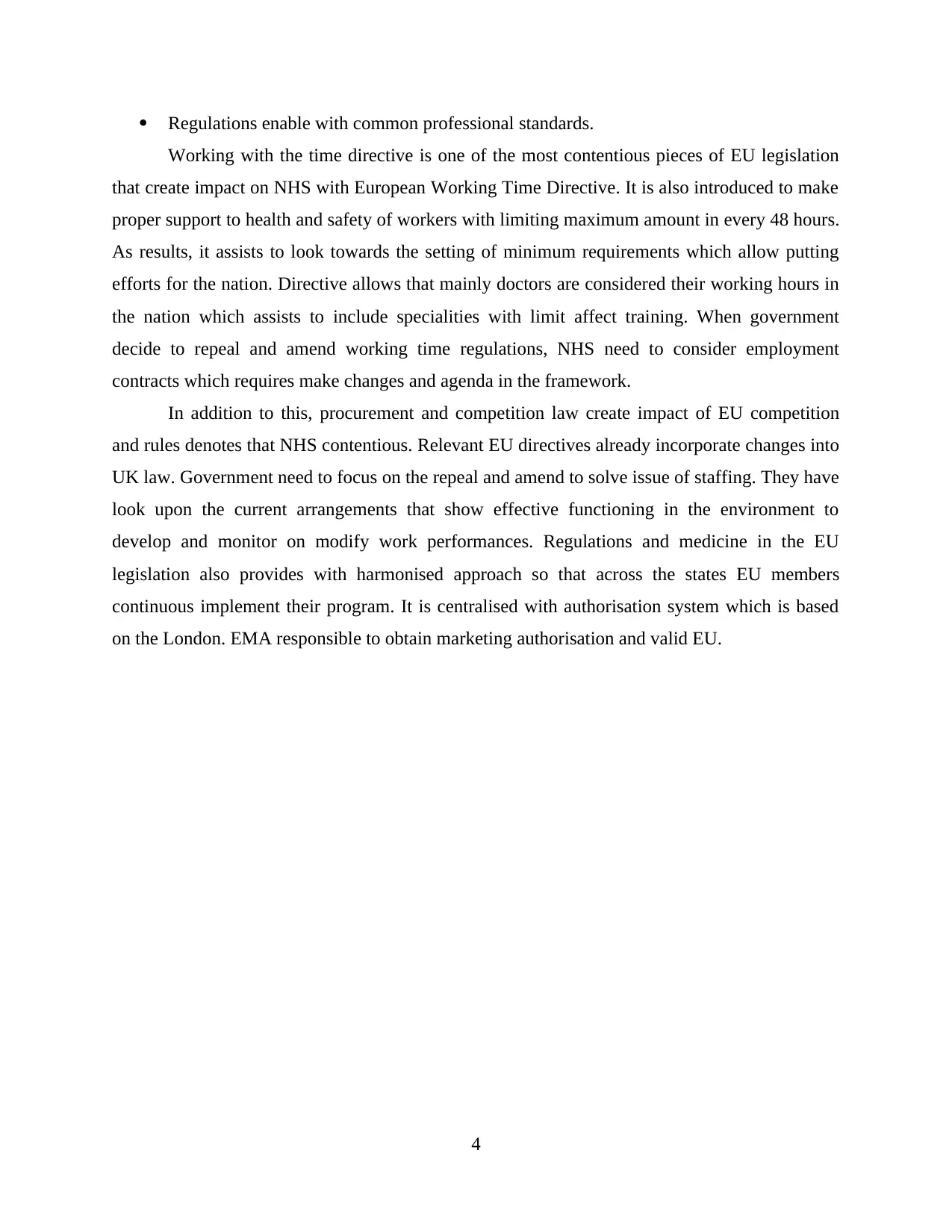
Regulations enable with common professional standards.
Working with the time directive is one of the most contentious pieces of EU legislation
that create impact on NHS with European Working Time Directive. It is also introduced to make
proper support to health and safety of workers with limiting maximum amount in every 48 hours.
As results, it assists to look towards the setting of minimum requirements which allow putting
efforts for the nation. Directive allows that mainly doctors are considered their working hours in
the nation which assists to include specialities with limit affect training. When government
decide to repeal and amend working time regulations, NHS need to consider employment
contracts which requires make changes and agenda in the framework.
In addition to this, procurement and competition law create impact of EU competition
and rules denotes that NHS contentious. Relevant EU directives already incorporate changes into
UK law. Government need to focus on the repeal and amend to solve issue of staffing. They have
look upon the current arrangements that show effective functioning in the environment to
develop and monitor on modify work performances. Regulations and medicine in the EU
legislation also provides with harmonised approach so that across the states EU members
continuous implement their program. It is centralised with authorisation system which is based
on the London. EMA responsible to obtain marketing authorisation and valid EU.
4
Working with the time directive is one of the most contentious pieces of EU legislation
that create impact on NHS with European Working Time Directive. It is also introduced to make
proper support to health and safety of workers with limiting maximum amount in every 48 hours.
As results, it assists to look towards the setting of minimum requirements which allow putting
efforts for the nation. Directive allows that mainly doctors are considered their working hours in
the nation which assists to include specialities with limit affect training. When government
decide to repeal and amend working time regulations, NHS need to consider employment
contracts which requires make changes and agenda in the framework.
In addition to this, procurement and competition law create impact of EU competition
and rules denotes that NHS contentious. Relevant EU directives already incorporate changes into
UK law. Government need to focus on the repeal and amend to solve issue of staffing. They have
look upon the current arrangements that show effective functioning in the environment to
develop and monitor on modify work performances. Regulations and medicine in the EU
legislation also provides with harmonised approach so that across the states EU members
continuous implement their program. It is centralised with authorisation system which is based
on the London. EMA responsible to obtain marketing authorisation and valid EU.
4
⊘ This is a preview!⊘
Do you want full access?
Subscribe today to unlock all pages.

Trusted by 1+ million students worldwide
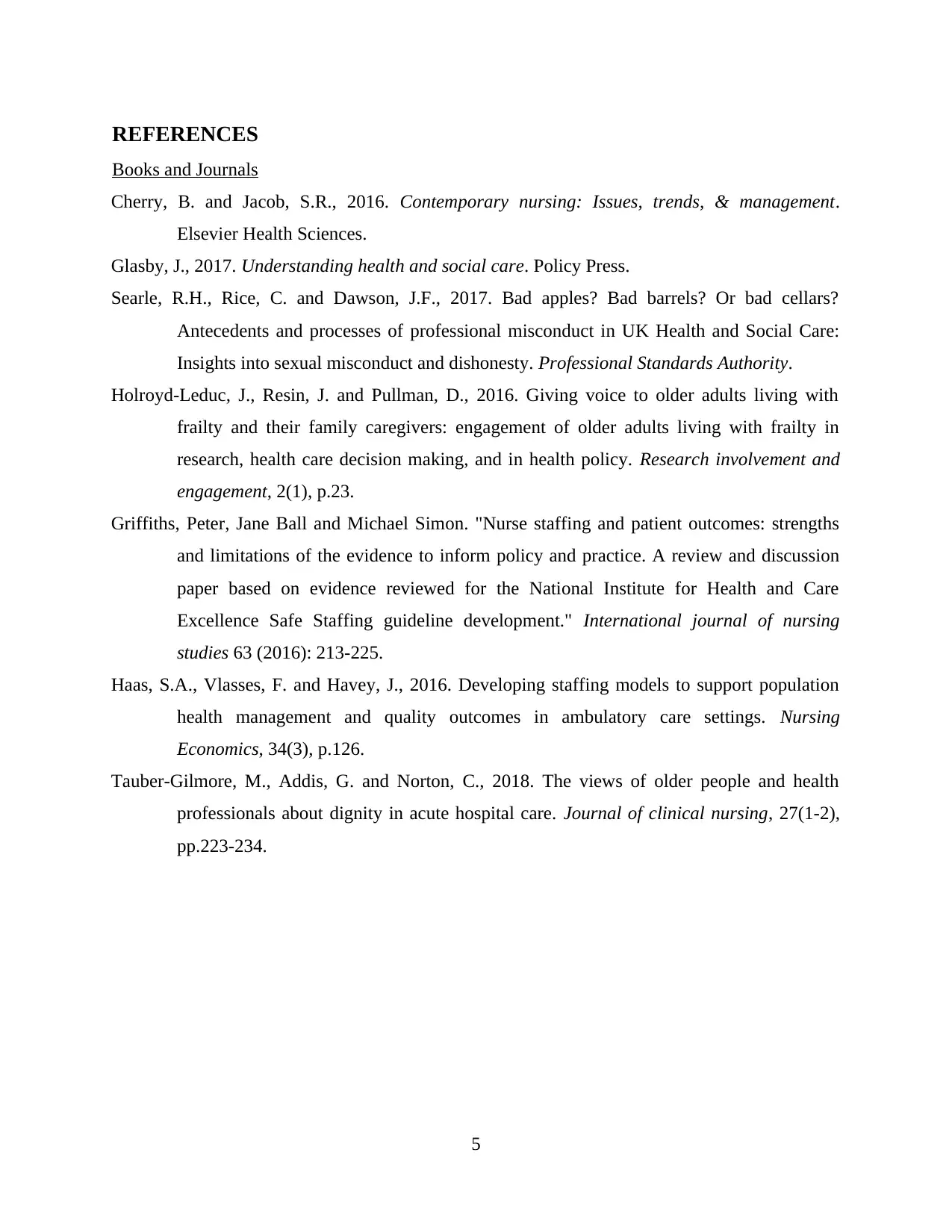
REFERENCES
Books and Journals
Cherry, B. and Jacob, S.R., 2016. Contemporary nursing: Issues, trends, & management.
Elsevier Health Sciences.
Glasby, J., 2017. Understanding health and social care. Policy Press.
Searle, R.H., Rice, C. and Dawson, J.F., 2017. Bad apples? Bad barrels? Or bad cellars?
Antecedents and processes of professional misconduct in UK Health and Social Care:
Insights into sexual misconduct and dishonesty. Professional Standards Authority.
Holroyd-Leduc, J., Resin, J. and Pullman, D., 2016. Giving voice to older adults living with
frailty and their family caregivers: engagement of older adults living with frailty in
research, health care decision making, and in health policy. Research involvement and
engagement, 2(1), p.23.
Griffiths, Peter, Jane Ball and Michael Simon. "Nurse staffing and patient outcomes: strengths
and limitations of the evidence to inform policy and practice. A review and discussion
paper based on evidence reviewed for the National Institute for Health and Care
Excellence Safe Staffing guideline development." International journal of nursing
studies 63 (2016): 213-225.
Haas, S.A., Vlasses, F. and Havey, J., 2016. Developing staffing models to support population
health management and quality outcomes in ambulatory care settings. Nursing
Economics, 34(3), p.126.
Tauber‐Gilmore, M., Addis, G. and Norton, C., 2018. The views of older people and health
professionals about dignity in acute hospital care. Journal of clinical nursing, 27(1-2),
pp.223-234.
5
Books and Journals
Cherry, B. and Jacob, S.R., 2016. Contemporary nursing: Issues, trends, & management.
Elsevier Health Sciences.
Glasby, J., 2017. Understanding health and social care. Policy Press.
Searle, R.H., Rice, C. and Dawson, J.F., 2017. Bad apples? Bad barrels? Or bad cellars?
Antecedents and processes of professional misconduct in UK Health and Social Care:
Insights into sexual misconduct and dishonesty. Professional Standards Authority.
Holroyd-Leduc, J., Resin, J. and Pullman, D., 2016. Giving voice to older adults living with
frailty and their family caregivers: engagement of older adults living with frailty in
research, health care decision making, and in health policy. Research involvement and
engagement, 2(1), p.23.
Griffiths, Peter, Jane Ball and Michael Simon. "Nurse staffing and patient outcomes: strengths
and limitations of the evidence to inform policy and practice. A review and discussion
paper based on evidence reviewed for the National Institute for Health and Care
Excellence Safe Staffing guideline development." International journal of nursing
studies 63 (2016): 213-225.
Haas, S.A., Vlasses, F. and Havey, J., 2016. Developing staffing models to support population
health management and quality outcomes in ambulatory care settings. Nursing
Economics, 34(3), p.126.
Tauber‐Gilmore, M., Addis, G. and Norton, C., 2018. The views of older people and health
professionals about dignity in acute hospital care. Journal of clinical nursing, 27(1-2),
pp.223-234.
5
1 out of 7
Related Documents
Your All-in-One AI-Powered Toolkit for Academic Success.
+13062052269
info@desklib.com
Available 24*7 on WhatsApp / Email
![[object Object]](/_next/static/media/star-bottom.7253800d.svg)
Unlock your academic potential
Copyright © 2020–2025 A2Z Services. All Rights Reserved. Developed and managed by ZUCOL.





